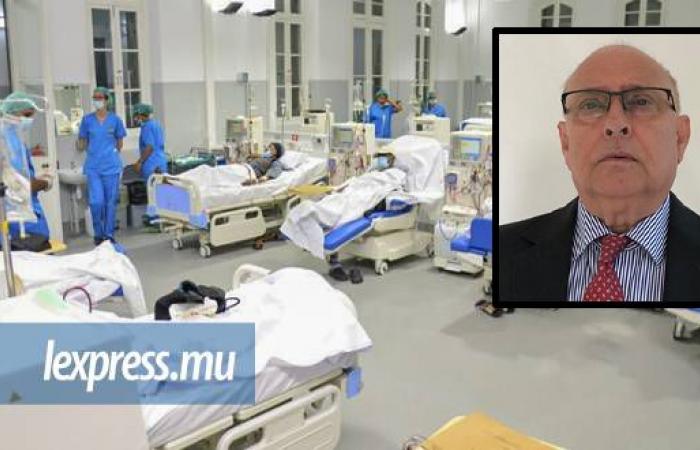Me Lockraj Nuckchedy chaired the “Medical Negligence Standing Committee”.
The reports made public on Friday shed light on the dysfunctions of the health system during the Covid-19 period, leading to the deaths of 12 dialysis patients. After being the subject of lively debates in Parliament, Me Lockraj Nuckchady, then president of the “Medical Negligence Standing Committee”, slammed the door speaking of “vested interests”, preventing him from working.
The report of Fact Finding Committee (FFC) reports 12 dialysis patients who died, two of whom were not infected with Covid-19. Of the 12 cases, 11 were examined by the Medical Negligence Standing Committee (MNSC). Both reports highlight failings in the management of these patients. The FFC report identifies non-compliance with protocols, understaffing at New Souillac Hospital (NSH), inadequate food and transport of patients in deplorable conditions, among others, and recommends changes to be made to the system. The second report is more complex. Questioned by Xavier-Luc Duval, then leader of the opposition, on June 27, 2023, on the conclusions of the MNSC, Dr Kailesh Jagutpal explained that of the 11 cases, two had been referred to the Medical Council and the Nursing Council. In the other nine, the Medical Council had recommended investigations. However, the relationship is more complex.
The former health minister had claimed that the report did not mention any specific negligence by officers. In virtually all cases, the MNSC highlighted “the committee cannot give specific names of officers concerned because requests to the ministry have gone unanswered”. But the document does mention the positions of these officers. The committee has, in all cases examined – even those where there was no negligence – requested that investigations be initiated against employees of the ministry, such as the one who decided to quarantine these vulnerable patients at the center of In Tamathe one who organized the transport or the coordinator of the dialysis sessions, among others. It also appears that decisions were taken because “Order comes from above” or that the symptoms of fever of one of the patients were ignored or that the PCR test of a patient was substituted for that of his wife, causing his transfer to the ENT hospital, then returning to the NSH.
Shortly after this response to Parliament, Mr. Nuckchady, who was at the head of MSNC, slammed the door of the body and spoke of «vested interests» which prevented him from working. Asked after the publication of the FFC report to go more in depth into the cases mentioned and the aspect of medical negligence more specifically, he explained that since his departure, he has remained silent out of a duty of restraint and respect for protocols. However, he confirms that his committee faced several problems, the first being the lack of documents, as specified in the published report.
In the case of the substituted PCR test, even the entries in the Occurrence Books were missing and it was necessary to rely on the testimonies of the depositors. Doctors made no entry on the state of health of the patients they examined. THE «dialysis sheets» of all patients were also missing. But that's not all. This committee did not have a secretariat and the members themselves had to write the reports. Problem of premises because each meeting took place in a different place.
Some cases are more critical than others. For example, a patient in critical condition, who had nevertheless been transferred from the NSH to the ENT hospital for a scan, died on the way back. The transfer was made in a «poorly equipped ambulance» and accompanied by a young doctor with no experience. The transfer took place in a vehicle with a limited amount of oxygen while he was dependent on it. “If we don’t call it negligence…”.
There are also these patients «left in agony» all night, evasive answers and death certificates confirming a heart attack after consultation between several doctors even though the patient had no heart problems. The report highlights that one of the deponent doctors pointed out that this death was most likely due to a heart attack caused by a metabolic imbalance due to missed dialysis sessions.
Which made the former president of the MNSC say that there was deplorable treatment of patients, which he had already confirmed in his report. “We had a first episode of Covid in 2020. A year later, there was no contingency plan?” Concerning his resignation and the «vested interests»he argues that the answers given to Parliament were not satisfactory. He left to express his disagreement. “There were cover-up attempts. These cases have been sent for investigation in the hope that this matter will be forgotten.he said.
No fault of the doctors
Asked, Dr Harrish Reesaul, president of the Medical Council, explained that investigations into the cases referred to him had been completed and that there had been no finding of negligence by doctors. “They did the most they could with the means available. There were no mistakes,” he explains, specifying that the body can only investigate doctors and not the administration or other departments. Concerning the officers mentioned in the report, we have not received a response from the Ministry of Health on the investigations carried out.
Legal proceedings – Me Nabiil Kaufid: “Possibility of bringing cases to justice”
Asked about the legal possibilities after the reports made public, Mr. Nabiil Kaufid first had a thought for the families of the victims, especially since he also considers that the reports are damning. “Fortunately, we are in a democracy. These cases can be brought before the Court and seek justice in light of the findings of the report.” The lawyer also points out that the documents make several relevant recommendations, especially concerning the care of vulnerable patients, and that these points must be taken into consideration.






